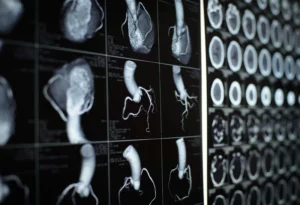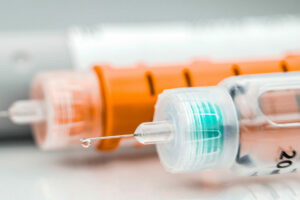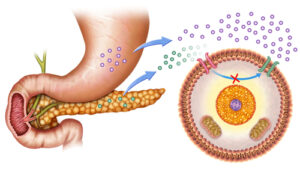If you or someone you know has diabetes, it’s important to be aware of the hyperosmolar hyperglycemic nonketotic syndrome (HHNS). This is a serious complication that can occur when blood sugar levels get too high. In this blog post, we will discuss the symptoms, causes, and treatment of HHNS. We will also provide tips for preventing this condition from occurring.
Contents
What Is Hyperosmolar Hyperglycemic Nonketotic Syndrome?
 Hyperosmolar hyperglycemic nonketotic syndrome (HHNS) is a serious complication that can occur when blood sugar levels get too high. This condition can lead to coma or even death if it is not treated promptly.
Hyperosmolar hyperglycemic nonketotic syndrome (HHNS) is a serious complication that can occur when blood sugar levels get too high. This condition can lead to coma or even death if it is not treated promptly.
HHNS typically occurs in people with type-II diabetes, although it can also occur in people with type-I diabetes. People with HHNS usually have high levels of sugar in their blood, but they may not have ketones present in their urine. This condition can be life-threatening if it is not treated promptly.
What Are The Symptoms Of HHNS?
The symptoms of HHNS can vary from person to person, but there are some common signs that you should be aware of. If you or someone you know has diabetes, it’s important to be aware of the following symptoms:
High levels of sugar in the blood
One of the most common symptoms of HHNS is high levels of sugar in the blood. If you or someone you know has diabetes, it’s important to check blood sugar levels regularly. It might be necessary to adjust insulin doses or make changes to your diet if blood sugar levels are consistently high.
Increased thirst and urination
Another common symptom of HHNS is increased thirst and urination. This is caused by the body trying to get rid of excess sugar through urine. When HHNS is left untreated, the body will become dehydrated and urine output will decrease which can lead to coma or death.
Extreme tiredness
Tiredness is another common symptom of HHNS. It is defined as feeling weary and lacking in energy. This can be a result of the body’s inability to use sugar properly which can lead to feelings of fatigue. It’s important to get plenty of rest and drink fluids if you are feeling tired.
Confusion or changes in mental status
Confusion or changes in mental status can also be a symptom of HHNS. It is the condition where a person is not able to think clearly. This can be caused by the body’s inability to use sugar properly which can lead to changes in mental status. If you or someone you know is acting confused, it’s important to seek medical help immediately.
Ketones present in the urine
 This is one of the most serious symptoms of HHNS and can be a sign that the body is starting to break down fat for energy. This can lead to a build-up of ketones in the blood which can be very dangerous. So, if you or someone you know has diabetes, it’s important to check for ketones in the urine regularly.
This is one of the most serious symptoms of HHNS and can be a sign that the body is starting to break down fat for energy. This can lead to a build-up of ketones in the blood which can be very dangerous. So, if you or someone you know has diabetes, it’s important to check for ketones in the urine regularly.
These are the most common symptoms of HHNS, but it’s important to remember that this condition can vary from person to person. You should always consult with a medical professional if you are concerned about your health
What Are The Causes Of HHNS?
There are many different factors that can contribute to the development of HHNS. Some of the most common causes include:
Poorly controlled diabetes
The hyperosmolar hyperglycemic nonketotic syndrome is most often seen in people who have poorly controlled diabetes. This means that blood sugar levels are not well-managed and can fluctuate frequently. You should work with your healthcare team to develop a plan that will help you control your blood sugar levels.
Infection
Infection is another common cause of HHNS. This can be any kind of infection, such as a urinary tract infection or pneumonia. Infections can cause the body to release hormones that can lead to high blood sugar levels. This is why it’s important to monitor your blood sugar levels if you are sick.
Heart attack
Heart attack is another possible cause of HHNS. This is because a heart attack can damage the nerves that control blood sugar levels. This can lead to high blood sugar levels and eventually HHNS. Heart attacks are a medical emergency and you should seek medical help immediately if you think you are having one.
Stroke
 Stroke is again a common cause of HHNS. This is because a stroke can damage the part of the brain that controls blood sugar levels. This can lead to high blood sugar levels and eventually HHNS. Proper treatment of a stroke is essential to prevent further damage to the brain.
Stroke is again a common cause of HHNS. This is because a stroke can damage the part of the brain that controls blood sugar levels. This can lead to high blood sugar levels and eventually HHNS. Proper treatment of a stroke is essential to prevent further damage to the brain.
Certain medications or treatments
Certain medications or treatments can also lead to the development of HHNS. This is because they can cause the body to release hormones that can lead to high blood sugar levels. If you are taking any medication or undergoing any treatment, it’s important to discuss the risks with your healthcare team.
As you can see, there are many different causes of HHNS. It’s important to work with your healthcare team to develop a plan that will help you manage your condition.
How Is HHNS Diagnosed?
There are many different ways that HHNS can be diagnosed. The most common way is through a blood test. This is because HHNS can lead to high levels of sugar in the blood. A blood test can help to confirm the diagnosis of HHNS. Other tests that may be used to diagnose HHNS include:
Urine test
A urine test can help to check for ketones in the urine. This can be a sign that the body is starting to break down fat for energy. It’s important to check for ketones in the urine if you have diabetes. The steps for a urine test are:
- Collect a sample of urine in a clean container.
- Take the urine sample to your healthcare provider or a lab for testing.
- A positive result means that there are ketones present in the urine.
Ketone test
A ketone test can help to check for ketones in the blood. This can be a sign that the body is starting to break down fat for energy. It’s important to check for ketones in the blood if you have diabetes. The steps for a ketone test are:
- Collect a sample of blood from a finger prick.
- Take the blood sample to your healthcare provider or a lab for testing.
- A positive result means that there are ketones present in the blood.
CT scan
 A CT scan can help to check for ketones in the brain. This can be a sign that the body is starting to break down fat for energy. It’s important to check for ketones in the brain if you have diabetes. The steps for a CT scan are:
A CT scan can help to check for ketones in the brain. This can be a sign that the body is starting to break down fat for energy. It’s important to check for ketones in the brain if you have diabetes. The steps for a CT scan are:
- You will be asked to lie on a table.
- You will be moved into the CT scanner.
- You will be asked to hold still while the scan is being done.
- The CT scan will take a few minutes.
- After the scan is done, you will be able to go home.
- A positive result means that there are ketones present in the brain.
MRI
An MRI can help to check for ketones in the brain. This can be a sign that the body is starting to break down fat for energy. It’s important to check for ketones in the brain if you have diabetes. The steps for an MRI are:
- You will be asked to remove any clothing or jewelry that might interfere with the scan.
- You will be asked to lie down on a table that will move into the scanner.
- Some people are given a contrast dye to drink before the scan. This dye helps to see certain structures better in the images.
- The technician will help you position your head and body in the scanner. You will need to stay still during the scan.
- The scan itself is painless, but it can be loud. You will be given earplugs or headphones to help block out the noise.
- The technician will be able to see you during the scan and will be able to hear you if you need to ask any questions.
- The scan will take 30-60 minutes.
After the scan, you will be able to go back to your normal activities. You may have some side effects from the contrast dye, such as feeling nauseous or having a headache. These side effects should go away within a day or so.
These are just a few of the things that can be done to diagnose the hyperosmolar hyperglycemic nonketotic syndrome. If you think that you may have this condition, it’s important to talk to your doctor. They will be able to help you get the treatment that you need.
How Is HHNS Treated?
The treatment for HHNS will vary depending on the severity of the condition. If you or someone you know has diabetes and is experiencing any of the symptoms listed above, it’s important to seek medical help immediately. Treatment may include:
Fluids through an IV
This is usually the first step in treating HHNS. Fluids help to lower blood sugar levels and prevent dehydration. It’s important to get fluids as soon as possible if you are experiencing symptoms of HHNS. The healthcare team will closely monitor your blood sugar levels and vital signs while you are receiving fluids.
Medications
If your blood sugar levels are still high after receiving fluids, you may need to take medication to lower them. Medications that may be used include insulin, glucagon, and/or sulfonylurea. These medications will help to lower your blood sugar levels and can be given through an IV or by mouth. It’s important to follow the instructions of your healthcare team when taking these medications.
Insulin
 If you have HHNS, your body may not be able to make enough insulin. Insulin is a hormone that helps the body to use sugar for energy. It’s important to get insulin if you have HHNS because it can help to lower blood sugar levels and prevent ketoacidosis. It is available in form of an injection, pen, or pump.
If you have HHNS, your body may not be able to make enough insulin. Insulin is a hormone that helps the body to use sugar for energy. It’s important to get insulin if you have HHNS because it can help to lower blood sugar levels and prevent ketoacidosis. It is available in form of an injection, pen, or pump.
Oral Glucose
If you have HHNS, you may need to take oral glucose. This is a sugar that the body can use for energy. It’s important to take oral glucose if you have HHNS because it can help to raise blood sugar levels and prevent ketoacidosis. Oral glucose is available in the form of tablets, gel, or powder. You can also get it in the form of a drink.
Electrolyte replacement
If you have HHNS, you may need to replace electrolytes. Electrolytes are minerals that help the body function properly. They include sodium, potassium, chloride, and bicarbonate. You may need to take electrolyte replacement if you have HHNS because it can help to prevent dehydration. It is available in the form of tablets, capsules, or liquids.
Close monitoring by a medical team
If you have HHNS, you will need to be closely monitored by a medical team. This team may include doctors, nurses, and/or diabetes educators. They will help to monitor your blood sugar levels and vital signs. They will also provide support and education. When you take insulin or other diabetes medications, it’s important to follow the instructions of your healthcare team.
As you can see, there are a few different treatments for HHNS. It’s important to seek medical help if you or someone you know has diabetes and is experiencing any of the symptoms of HHNS. The healthcare team will be able to provide the treatment that is needed.
What Are The Complications Of HHNS?
There are many potential complications that can occur as a result of HHNS. Some of the most common complications include:
Coma
Coma can occur when blood sugar levels are very high. It’s important to seek medical help immediately if you or someone you know has diabetes and is experiencing any of the symptoms of HHNS. It’s also important to monitor blood sugar levels closely.
Ketoacidosis
 Ketoacidosis is a serious complication that can occur as a result of HHNS. It happens when the body starts to break down fat for energy. This can lead to high levels of ketones in the blood. Ketoacidosis can be fatal if it’s not treated immediately.
Ketoacidosis is a serious complication that can occur as a result of HHNS. It happens when the body starts to break down fat for energy. This can lead to high levels of ketones in the blood. Ketoacidosis can be fatal if it’s not treated immediately.
Brain damage
Brain damage can occur as a result of HHNS. This is because high blood sugar levels can damage the blood vessels in the brain. This can lead to a stroke or other problems. It is best to seek medical help immediately if you or someone you know has diabetes and is experiencing any of the complications of HHNS.
Kidney failure
One of the complications of HHNS is kidney failure. This is because high blood sugar levels can damage the kidneys. Kidney failure can be fatal if it’s not treated immediately. Our kidneys are very important to our overall health, so it’s important to seek medical help in case of any problems.
There are many potential complications that can occur as a result of HHNS. It’s important to seek medical help immediately in case any of these complications develop. The sooner treatment is started, the better the chances are for a full recovery.
Conclusion
In conclusion, the hyperosmolar hyperglycemic nonketotic syndrome is a serious complication of diabetes that can lead to death. If you have diabetes, it is important to monitor your blood sugar levels closely and seek medical help if you develop symptoms of this condition. Early diagnosis and treatment are essential for the best possible outcome.
For more such information on Diabetes care, consider contacting Mantra Care. Our team of experts can help you manage your diabetes and improve your overall health with our Diabetes Control Program. You can also get in touch with their nutrition experts through our online nutrition counseling, who can guide you through the process and help you achieve your fitness goals.


